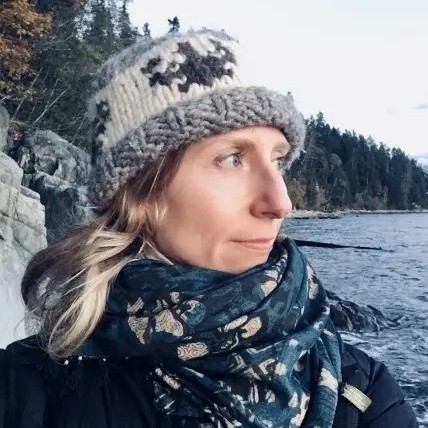The Looking Glass: Reconciliation is Not a Metaphor

Justine Townsend is a PhD Candidate in the Department of Geography, Environment and Geomatics. Her research interrogates the possibilities for reconciliation in the Canadian conservation sector, particularly by supporting the current surge in Indigenous Protected and Conserved Areas. She is also a doctoral researcher with the Conservation through Reconciliation Partnership (CRP) at the University of Guelph.
The CRP is a research partnership co-hosted by the University of Guelph, IISAAK OLAM Foundation and Indigenous Leadership Initiative, that is building support for Indigenous-led conservation in Canada. As co-lead and principal investigator Dr. Robin Roth explains, the partnership is cultivating a “collaborative and reciprocal space where Elders, university and community-based researchers, conservation practitioners and community partners work together to inform, support and amplify Indigenous-led conservation.” Justine’s involvement has included project and communications support, and knowledge mobilization such as launching the Virtual Campfire Series.
Reconciliation is not a metaphor
This year, National Indigenous History Month necessitated difficult reflections from those of us living in Canada who do not have Indigenous ancestry. It especially invited deep and ongoing reflection from those of us with European ancestry. Uncovering the truth is a necessary precursor to reconciliation, and reconciliation is certainly not achieved by apologies alone.
With the unearthing of the remains of nearly 1000 children in unmarked burial sites on the grounds of Indian residential schools across Canada this past June, many of us are filled with grief, rage, hopelessness, and conviction. Some are shocked, yet many more are not. For all of us, this is another moment of reckoning in settler-Indigenous relations and the fraught but vital path of justice and reconciliation.
We see the re-traumatization the news is wreaking on Indigenous Peoples across Turtle Island. As Canadian citizens we can—and must—do all that we can to change the course we are on as a nation. Indeed, Canada is settled on the lands and waters of many hundreds of Indigenous Nations whose civilizations predate European settlement by millennia.
As members of an academic community, whether we are students, faculty, or staff we also have an opportunity to reflect on the institutional and research practices of academia at large, and the University of Guelph in particular.
Universities are increasingly seeking to open their borders to students from all backgrounds and knowledge traditions by removing barriers to learning while challenging norms of academic knowledge production. These norms have systematically as well as inadvertently harmed and oppressed Indigenous and other racialized peoples and their knowledge systems. As Eve Tuck and Wayne Yang (2012) powerfully state, “decolonization is not a metaphor.” And neither is reconciliation.
The University of Guelph’s Indigenous Initiatives Strategy, "Bi-Naagwad: It comes into view” demonstrates the university’s commitment to decolonization and reconciliation. It contains concrete actions intended to create impactful change in university governance, campus environment, Indigenous student support, research and scholarship, and pedagogy and curriculum. The challenge now is for the university and academic community to implement these actions and live up to their aspirations.
Luckily, frameworks for building capacity for decolonization and reconciliation exist.
“Ethical Space” is one of the guiding principles of the Conservation through Reconciliation Partnership (CRP). Elders Dr. Reg Crowshoe and Prof. Willie Ermine developed this conceptual model to encourage a non-hierarchical and respectful space of collaboration. In Ethical Space, all knowledge systems, legal traditions and laws, protocols, methodologies, and practices are equally valued and engaged. The strength is in recognizing the merits of each contribution and cultivating the capacity to look through multiple lenses. This is akin to Mi’kmaw elder Albert Marshall’s teaching of Etuaptmumk, or Two-Eyed Seeing. Two-Eyed Seeing involves drawing on the strengths of Indigenous and Western knowledge systems and worldviews. Elder Albert Marshall is a member of the CRP’s Elder’s Lodge which guides the CRP’s work.
Ethical Space and Two-Eyed Seeing involve cultivating the capacities needed to advance the messy and ongoing work of reconciliation at home, in our communities, and in the university. These capacities include respect, curiosity, flexibility, and willingness. This willingness to show up can feed the commitment to stand for a brighter day when all our children can equally thrive.
May this outgoing National Indigenous History Month—and the tragic news about unmarked graves which is bound to continue—be a time for settler communities, particularly those of European descent, to commit to the critical work that Paulette Regan (2010) calls “unsettling the settler within.” Reflecting on ways we can honour Indigenous Peoples and the Earth need not be relegated to one month of the year. There are calls to action we can, and must, take up every day.
Sources cited:
- Regan, P. (2010). Unsettling the settler within: Indian residential schools, truth telling, and reconciliation in Canada. UBC Press.
- Tuck, E., & Yang, K. W. (2012). Decolonization is not a metaphor. Decolonization: Indigeneity, Education, & Society, 1(1), 1–40.